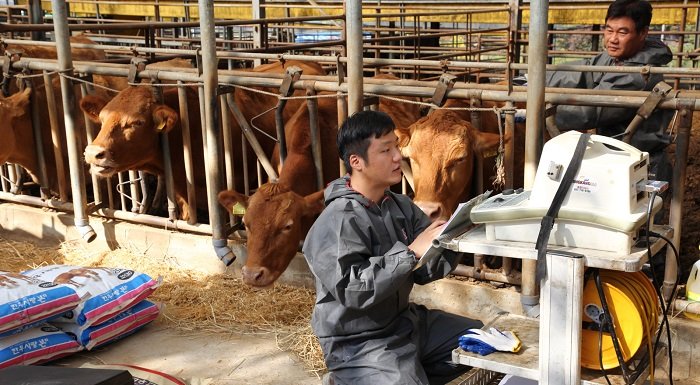South Korea's Ministry of Agriculture, Food and Rural Affairs will invest about 10 billion won over the next three years to conduct a trial of cow breeding methods aimed at reducing greenhouse gases generated during the process.
The feeding trial program would be for roughly 600 calves at a farm run by the National Agricultural Cooperative Federation in Anseong, Gyeonggi Province, based on the genetic trait, breeding season, and nutritional level.
The length of the cow breeding time has increased over the last 20 years, and farmers have become more reliant on feed grain, making the breeding procedure more expensive.
The fattening cow breeding time was prolonged from around 23 months in 2000 to about 30 months in 2020, increasing excrement and greenhouse gas emissions.
The ministry hopes to build an appropriate breeding model as well as reduce the slaughter age of cows from 30 to 24 months with this program.
If the breeding season is shortened, the number of greenhouse gases produced per cow can be lowered to around 75 percent of what it is now. Furthermore, the cost of feeding a cow can be decreased by roughly 1 million won.



 Oil Prices Slide on US-Iran Talks, Dollar Strength and Profit-Taking Pressure
Oil Prices Slide on US-Iran Talks, Dollar Strength and Profit-Taking Pressure  Burkina Faso and Mali’s fabulous flora: new plant life record released
Burkina Faso and Mali’s fabulous flora: new plant life record released  OpenAI Expands Enterprise AI Strategy With Major Hiring Push Ahead of New Business Offering
OpenAI Expands Enterprise AI Strategy With Major Hiring Push Ahead of New Business Offering  SoftBank Shares Slide After Arm Earnings Miss Fuels Tech Stock Sell-Off
SoftBank Shares Slide After Arm Earnings Miss Fuels Tech Stock Sell-Off  India–U.S. Interim Trade Pact Cuts Auto Tariffs but Leaves Tesla Out
India–U.S. Interim Trade Pact Cuts Auto Tariffs but Leaves Tesla Out  Nvidia CEO Jensen Huang Says AI Investment Boom Is Just Beginning as NVDA Shares Surge
Nvidia CEO Jensen Huang Says AI Investment Boom Is Just Beginning as NVDA Shares Surge  Gold and Silver Prices Rebound After Volatile Week Triggered by Fed Nomination
Gold and Silver Prices Rebound After Volatile Week Triggered by Fed Nomination  Ukraine minerals deal: the idea that natural resource extraction can build peace has been around for decades
Ukraine minerals deal: the idea that natural resource extraction can build peace has been around for decades  Hims & Hers Halts Compounded Semaglutide Pill After FDA Warning
Hims & Hers Halts Compounded Semaglutide Pill After FDA Warning  TrumpRx Website Launches to Offer Discounted Prescription Drugs for Cash-Paying Americans
TrumpRx Website Launches to Offer Discounted Prescription Drugs for Cash-Paying Americans  We combed through old botanical surveys to track how plants on Australia’s islands are changing
We combed through old botanical surveys to track how plants on Australia’s islands are changing  Trump Backs Nexstar–Tegna Merger Amid Shifting U.S. Media Landscape
Trump Backs Nexstar–Tegna Merger Amid Shifting U.S. Media Landscape  Silver Prices Plunge in Asian Trade as Dollar Strength Triggers Fresh Precious Metals Sell-Off
Silver Prices Plunge in Asian Trade as Dollar Strength Triggers Fresh Precious Metals Sell-Off  Trump Lifts 25% Tariff on Indian Goods in Strategic U.S.–India Trade and Energy Deal
Trump Lifts 25% Tariff on Indian Goods in Strategic U.S.–India Trade and Energy Deal  Instagram Outage Disrupts Thousands of U.S. Users
Instagram Outage Disrupts Thousands of U.S. Users  SpaceX Pushes for Early Stock Index Inclusion Ahead of Potential Record-Breaking IPO
SpaceX Pushes for Early Stock Index Inclusion Ahead of Potential Record-Breaking IPO 































